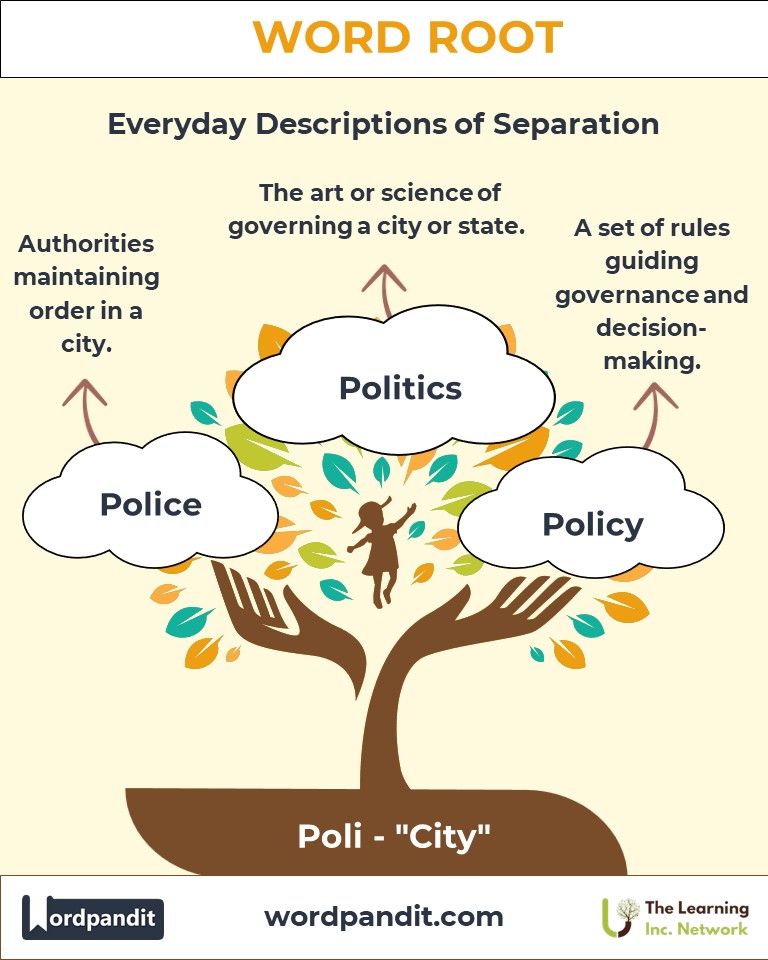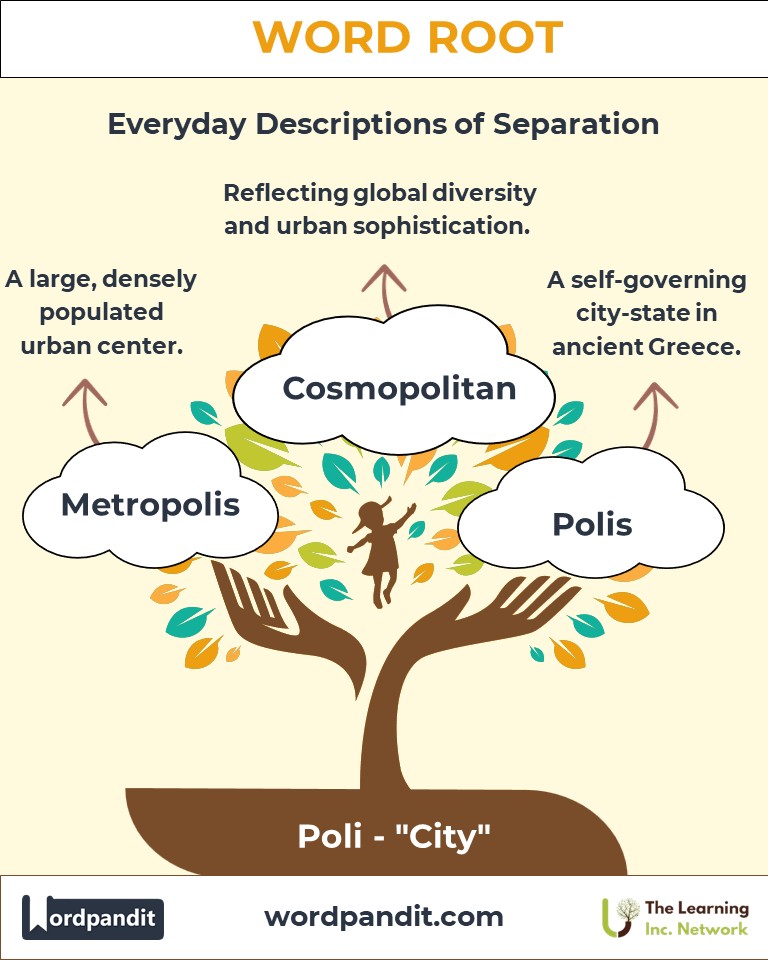Poli: The Root of Cities and Civilization
Discover the power of the root "Poli," derived from the Greek word "polis," meaning "city." From governance and protection to the sprawling metropolises of today, this root lays the foundation for words that define urban life, structure, and society.

Table of Contents
- Introduction: The Core of "Poli"
- Etymology and Historical Journey
- Mnemonic: Unlocking the Power of "Poli"
- Common Poli-Related Terms
- Poli Through Time
- Poli in Specialized Fields
- Illustrative Story: Poli in Action
- Cultural Significance of "Poli"
- The Poli Family Tree
- FAQs About the Poli Root
- Test Your Knowledge: Poli Mastery Quiz
- Conclusion: The Enduring Legacy of "Poli"
1. Introduction: The Core of "Poli"
Imagine a bustling metropolis, with skyscrapers scraping the clouds, streets buzzing with energy, and communities thriving in harmony. The root "Poli," pronounced "pah-lee," encapsulates this essence of urban life. Originating from Greek, "Poli" means "city" and forms the backbone of terms like "police" (keepers of order) and "metropolis" (mother city). In every word it graces, "Poli" brings a sense of community, governance, and civilization.

2. Etymology and Historical Journey
The root "Poli" traces its origin to the ancient Greek word polis (city-state). In classical antiquity, a polis was more than a physical space; it was a hub of governance, culture, and societal organization. Famous city-states like Athens and Sparta epitomized the concept of "polis," influencing political systems worldwide.
As Greek civilization flourished, "Poli" entered Latin and subsequently modern languages, giving rise to terms that encapsulate urban governance and civic identity. Over time, it became a foundation for describing cities' physical, cultural, and administrative aspects.
3. Mnemonic: Unlocking the Power of "Poli"
To remember "Poli," picture a police officer guarding a vibrant metropolis. Imagine them standing at a city’s heart, ensuring order and safety amidst the urban bustle.
Mnemonic Device: "Poli protects the polis—from the police in metropolises to politics shaping cities."
4. Common Poli-Related Terms
- Police (puh-lees): Authorities responsible for maintaining order in a city or community.
Example: "The police patrol the streets to ensure public safety." - Metropolis (meh-tro-puh-lis): A large, densely populated urban area, often a cultural or economic center.
Example: "New York is considered a metropolis of opportunity and diversity." - Policy (pah-lih-see): A course of action or set of rules guiding decision-making in governance or organizations.
Example: "The city council introduced a new policy to reduce traffic congestion." - Politics (pah-lih-tiks): The art or science of governing a city, state, or nation.
Example: "Ancient Greek politics laid the foundation for modern democracy." - Cosmopolitan (kahz-muh-pah-luh-tin): Reflecting global diversity and sophistication, often associated with urban settings.
Example: "London is known for its cosmopolitan vibe, with influences from around the world."
5. Poli Through Time
- Polis (Ancient Greece): Refers to city-states that were the bedrock of governance and culture in Greek civilization.
- Metropolitan (Middle Ages): Originally linked to bishops overseeing major cities, it later evolved to describe large urban areas.
- Cosmopolitan (Modern Era): Initially a philosophical idea of being a "citizen of the world," it now denotes worldly, urban sophistication.
6. Poli in Specialized Fields
- Law Enforcement: Police maintain public safety and enforce laws.
- Urban Studies: Metropolises attract cultural and economic growth.
- Political Science: Politics is rooted in ancient governance systems like the polis.
- Cultural Studies: Cosmopolitanism highlights diversity in urban life.
7. Illustrative Story: Poli in Action
In the heart of a sprawling metropolis named Poliville, a young officer named Leo joined the city police. Tasked with fostering community trust, Leo collaborated with local leaders to create fair policies. Over time, Poliville thrived, transforming into a cosmopolitan hub where diverse cultures and politics shaped its vibrant identity. Leo's work demonstrated the enduring importance of "Poli" in uniting communities.
8. Cultural Significance of "Poli"
"Poli" represents more than urban areas—it embodies humanity's collective pursuit of governance, culture, and coexistence. Ancient Greek city-states like Athens were cradles of democracy, while modern metropolises symbolize economic growth and cultural diversity. The term also highlights urban challenges, from policymaking to maintaining law and order, underscoring its timeless relevance.

9. The Poli Family Tree
-
Civ (Latin: City):
- Civic: Relating to citizens or a city.
- Civilization: The development of organized societies.
-
Urbs (Latin: City):
- Urban: Pertaining to cities.
- Suburb: Residential areas surrounding a city.
-
Cosmo (Greek: World, Universe):
- Cosmos: The universe as an orderly system.
- Cosmology: Study of the universe’s origins.

FAQs About the "Poli" Word Root
Q: What does "Poli" mean?
A: The root "Poli" originates from the Greek word "polis," meaning "city." It serves as the foundation for words related to urban life, governance, and community organization. Examples include "police" (maintaining order in a city) and "politics" (the art of governing a city or state).
Q: What is a polis in ancient Greece?
A: In ancient Greece, a polis was a city-state, a self-governing political entity central to Greek life. These city-states, like Athens and Sparta, were hubs of governance, culture, and innovation, often forming the foundation of Western political and philosophical thought.
Q: How does "Poli" connect to the word "police"?
A: The word "police" stems from the Greek "politeia," referring to the administration of a city or state. The police embody this concept by enforcing laws and maintaining order within urban communities, ensuring the smooth functioning of the polis.
Q: What is a metropolis?
A: A metropolis is a large, densely populated city often serving as the cultural, economic, or administrative center of a region or country. The word combines "meter" (mother) and "polis" (city), symbolizing its role as the "mother city" that influences surrounding areas.
Q: Is "cosmopolitan" related to "Poli"?
A: Yes, "cosmopolitan" merges "cosmo" (world or universe) and "poli" (city), describing a person or city that is worldly, sophisticated, and culturally diverse. It reflects the blending of global influences within urban environments.
Test Your Knowledge: "Poli" Word Root Quiz
1. What does "Poli" mean?
2. Which word refers to law enforcement in cities?
3. What is a metropolis?
4. What does the term "cosmopolitan" signify?
5. What term describes the art of governing a city?
12. Conclusion: The Enduring Legacy of "Poli"
From ancient city-states to bustling metropolises, "Poli" captures the essence of urban life, governance, and civilization. As cities grow and evolve, "Poli" will continue to inspire connections and innovations.














